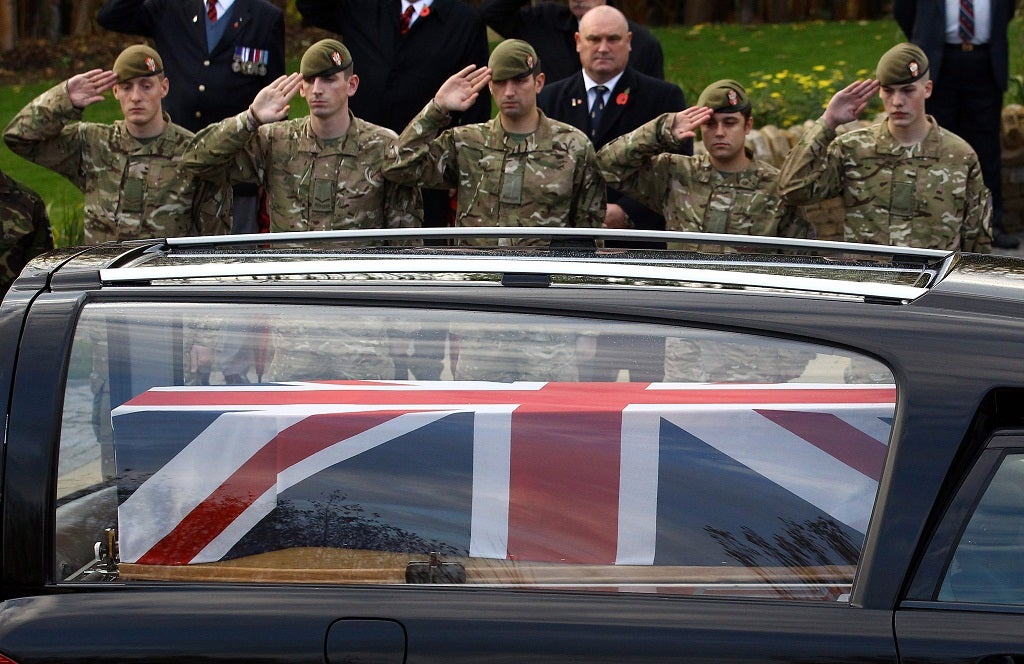Too close for comfort: Prime Ministers, the arms industry, and Remembrance Day
An Afghanistan veteran who protested against the war by refusing to serve a second tour examines the ties between politics and the arms industry


You didn’t need to be a pessimist to scoff at Tony Blair’s speech to the Iraqi Business Board last week. Striking a familiar note, the former Prime Minister called for more British investment in Iraq and trumpeted the region's economic growth.
Nearly ten years on from the invasion, the only people who seem chuffed about the Iraq War these days are its architects and their dedicated cheerleaders. Blair’s particular cynicism lies in the fact that he frames promoting British interests in Iraq as a moral obligation - something to help the Iraqi economy - rather than as a continuation of the looting of that country.
We’ve heard many times already that this war was "all about oil". While that’s no doubt a simplification, there is a widely held view that the goals of big business, the military and Westminster politicians are bound up more than ever in the post 9/11 wars.
Prime Dealer
Take Cameron’s recent visit to Saudi Arabia. There, the PM attempted to soothe relations and convince the regime to buy British when they replace their fighter jets. Cameron seems at ease in the role of salesmen and advocate of our (highly inefficient) arms industry. Time and again, the arms industry is singled out for helpful state intervention. Critics point to the hundreds of millions of pounds laid on to bolster what is a very small contributor to GDP (at a little over 1%) and employment at this time of particular hardship.
The moral question of arms-dealing must also be accounted for. The argument that countries in this fraught Middle Eastern region are entitled to defend themselves is less convincing when you consider that the main challenge to the Saudi regime and others in recent times has issued from its own people. The Prime Minister’s assertion that it’s important to respect “individual countries' journeys" seems not to include the people in those countries - who for some time now have been having a red-hot go at journeying towards a few relatively mild reforms.
Uneven field
In Afghanistan, the fact that big business and the military are profoundly interwoven was literally right on top of us. The size of private military company Kellogg, Brown and Root’s presence in Kandahar wasn’t far off the British Army’s when I served a tour there in 2006. The KBR workers were on higher pay and were better equipped than us lowly squaddies, who had to wait several months to get boots which didn’t tear our feet apart.
The blurring of war and business is also apparent on the home front. I visited the Imperial War Museum recently, for the first time since I was a nervy recruit on an educational day out from Deepcut barracks. I found that the slickly-presented exhibit ‘War Story: Serving in Afghanistan’ was being officially supported by Boeing, outfitter of the Chinook and Apache helicopter fleets which are mainstays of the British effort in Central Asia. Among the looped video testimonies were a number of officers and NCO’s suggesting the viewer focus less on the deaths and more on the good works being done in Afghanistan. That's certainly better publicity for Boeing...
Only a month after I visited the museum, Cameron made an uncomfortably celebratory pledge in his speech there, promising tens of millions for events remembering WW1 and the conflict’s major battles. Needless to say, the tone was one of the uncritical soldier worship which we see throughout our society today.
More perturbing still, there have been suggestions that retired military officers have used Remembrance Day as a cover for business interests. Lt. General John Kiszely went as far as to claim - unfortunately in front of journalists posing as arms dealers - that events meant to commemorate our glorious dead are “tremendous networking opportunities”.
Is it a coincidence or merely inept timing that Blair has chosen the period of remembrance to urge businesses to capitalise on the opportunities derived from the 'sacrifices' of British soldiers?
And is it too far-fetched to suggest that Cameron’s wearing of the poppy while fetching and carrying for the arms industry is at odds with the lessons of past wars?
I doubt anyone who can get close enough is likely to put the questions, but whatever our economic sensibilities, the nexus of unaccountable arms companies, elected politicians and modern-day brass hats isn’t just worrying in terms of transparency and vested interest; it is entirely disrespectful to the war dead and their ‘sacrifice’.
Join our commenting forum
Join thought-provoking conversations, follow other Independent readers and see their replies
Comments
Bookmark popover
Removed from bookmarks